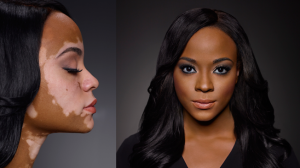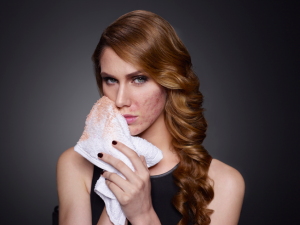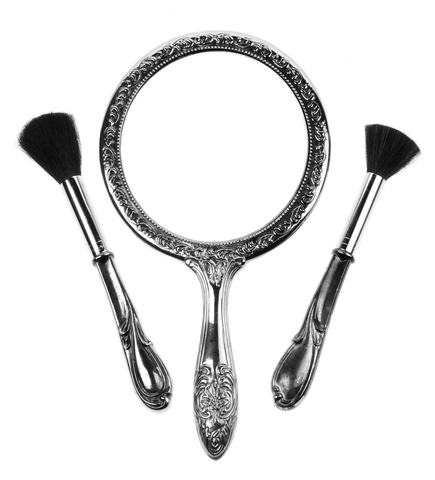“I’m inviting you to blend in to stand out.”
Cheri Lindsay for Dermablend (www.adweek.com)
This is what Cheri Lindsay says in her testimonial for Dermablend camouflage makeup, whose adverts have been getting a lot of attention for their visually surprising and emotional accounts of using camouflage makeup to cover skin conditions. Lindsay’s statement is obviously a pun, on blending in makeup rather than – or as well as? – blending in socially, but I still take issue with it. **Not with Dermablend or their camouflage makeup, but with the wider idea as it works in cosmetics advertising.** I mean, really: blending in to stand out? And I’m going to get academic on its ass.
(Pulp Fiction http://www.ugo.com)
The key idea behind this advertising campaign is that of the True Self. Buy this product and reveal your True Self – to yourself and the rest of the world. In Dermablend’s other advert, model Cassandra Bankson, who has acne, says, “I used to use makeup to cover up, and to hide who I was. Now I use it to express myself, and to show the world who I truly am”. I sense a contradiction here: covering up to reveal your True Self?
The same logic as in Lindsay’s statement is at work here – buy this product and find your True Self – or as Michelle M. Lazar puts it, advertisers “link the normative practice of beautification with an emancipated identity” (“The Right to be Beautiful” p.37). Normative = telling us what to do, which the beauty industry certainly does. And cosmetics adverts link this pressure to do beauty work with the idea that the product will set us free from skin imperfections and self-consciousness, to be who we really are: that’s the “emancipated identity”, or the True Self.
The logic of the True Self has been used throughout the growth of consumer culture, since to make people buy something you have to make them feel that they’re “worth it”. Or that they need it. So we have been persuaded that the things we choose to buy define and express who we are: adverts then tap into who we want to be. That’s the logic of capitalism all over: it’s everyone for themselves, and if you can construct the most attractive, skilled and likeable Self then you will be successful.
And we definitely need perfect skin to do that, right?
Apparently so. Cassandra Bankson says in her testimonial, “We think that to be successful we have to be a certain way, when in reality, in order to be successful and happy, all we have to do is be ourselves.” But is that the Self who has acne, or the Self who appears not to have acne because she’s wearing a really great foundation? And is that really what defines Bankson’s True Self – her skin?
Cassandra Bankson for Dermablend (www.adweek.com)
Don’t get me wrong, I would never take issue with camouflage makeup to cover up skin conditions. I am concerned with the extension of this idea to all skin ‘imperfections’, because Dermablend’s adverts imply that the only way to reveal your True Self is to have unrealistically perfect skin. It makes sense when Cheri Lindsay says that her makeup helps “people to look through the initial shock” of her skin condition “and see who I was as a person”, so that she can go through life being asked about her work or her interests rather than being asked what’s wrong with her face. Absolutely. But does that extend to everyone who has a couple of spots and slightly uneven skin tone (something I suspect was just invented by cosmetics advertisers)? No: in that case it suggests that you aren’t a proper person unless you have PhotoShop-perfect skin. I don’t feel that is helpful to my True Self. Or any of my other Selves, who are feeling a bit inadequate now.
Lazar writes that “the freedom to be beautiful is implicitly set against the ‘tyranny of ugliness’” (p.40) and I think we can all understand how it is possible to feel trapped in an unattractive body. I think the emotional power of Dermablend’s ads draws on this. Cosmetics give us the freedom to change the way we look, to express rebellion or sweetness, softness or power, and this is no bad thing. As Geoffrey Jones says in Beauty Imagined: A History of the Global Beauty Industry, “the mass production of beauty has been a force for the democratization of personal aesthetics … it granted to every man and woman new powers of self-reinvention” (p.275). I agree that this is a liberty, and a good one.
It becomes less good, though, when beauty is no longer a choice: Marlis Schweitzer writes that since around 1911, advertisers have “preached that it was not only possible for all women to be beautiful, but it was also every woman’s responsibility to be beautiful” (“The Mad Search for Beauty” p.136). Spreading this attitude is, of course, a very good way of selling cosmetics – creating a need and then supplying the solution, another basic principle of capitalist economics. And it is no coincidence that the rise of this “responsibility to be beautiful” happened at the same time as the rise of consumer culture and also of testimonial advertising, of which the cosmetics industry has always been “one of the most active and innovative exponents” (Schweitzer p.135). Now we’re under the tyranny of beauty.
(Les Dolgatsjov, http://www.viscoimages.com)
What all this means is that Dermablend’s claim to liberate us from unattractive skin in order to reveal our True Selves is not the answer to a natural human problem. It’s the result of a hundred years of capitalism in which beauty has been constructed as the only way for women to become successful and happy, and the idea of a True Self has been created as a way of selling us stuff. What is a True Self anyway?
Or am I taking that too far?
After all, Dermablend’s camouflage makeup is intended for skin conditions like Bankson’s and Lindsay’s, so that they can go about their business without being mocked or stared at, which is great.
But. They’re still “inviting” us to “blend in to stand out”. To be normal, to be indistinguishable from others, so that we can, er, “stand out” in some unspecified way. We’re all under the tyranny of the normal, and are mocked and rejected if we stray too far from the standard. That’s what Dermablend is offering: to make you normal. In this case, to judge by Bankson and Lindsay, ‘normal’ is beautiful, so we seem to have come back round to the same old problem, that women are just not allowed to be anything other than beautiful – and this is one narrow definition of beauty.
My True Self has gone to plan a revolution. She isn’t wearing foundation.
References:
Jones, Geoffrey. Beauty Imagined: A History of the Global Beauty Industry. Oxford and New York: Oxford University Press, 2010.
Lazar, Michelle M. “The Right to be Beautiful: Postfeminist Identity and Consumer Beauty Advertising”. In New Femininities: Postfeminism, Neoliberalism and Subjectivity. Rosalind Gill and Christina Scharff, eds. Basingstoke: Palgrave Macmillan, 2011.
Schweitzer, Marlis. “‘The Mad Search for Beauty’: Actresses, Cosmetics, and the Middle-Class Market”. In Testimonial Advertising in the American Marketplace: Emulation, Identity, Community. Marlis Schweitzer and Marina Moskowitz, eds. New York: Palgrave Macmillan, 2009.






April 9th, 2014 at 4:25 pm
This reminds me of a dissertation a colleague wrote. Some women feel more authentic without makeup and some feel more authentic with it — so used to it, it’s become part of their identity.
April 9th, 2014 at 4:38 pm
Yes, it’s dangerous to make generalisations and I found this a difficult topic to tackle. But I still don’t want to blend in!
April 9th, 2014 at 5:26 pm
I couldn’t possibly agree more. That’s the most hypocritical thing I have ever heard. Let’s reveal our true selves by conforming to what society deems is beautiful. Uh, no thanks, I’ll pass. Love your blog! Care to check out mine? Downwiththenorm.wordpress.com
April 11th, 2014 at 9:34 am
Thanks – and I’m glad to have found your blog, it’s great!
April 9th, 2014 at 8:27 pm
I’m reminded of a time when Miss Manners/Judith Martin surprised me. In discussing how to handle the situation of a low-income student at a school dominated by much higher income students, Miss Manners recommended that the student’s parents should buy her (for example) one sweater of a quality level equal to her classmates, rather than several cheaper ones.
I remember being startled and vaguely indignant, but then I agreed. Miss Manners didn’t mean that people *should* have to maintain a particular standard, and if someone were to mock a student for wearing a cheaper sweater, she would (wittily) cut that person to pieces. No, you shouldn’t be defined by the quality of a sweater.
But in the world of adolescents, you *will* be defined by it. If you wear clothes that deviate too far from the norm, you will be defined by that. Everything else about you will be ignored.
That’s lousy. It’s wrong. It’s unfair. But it’s true. And that one student shouldn’t have to take the burden of the wrongness in the world, shouldn’t have to embrace the unfair “punishment” because taking action to avoid it would mean that she’s adapting to the unfairness.
If she wants to take a principled stance and wear the cheaper clothes, that’s just dandy and admirable. But refusing to do so, refusing to stand still and allow society to throw tomatoes at her because ducking for cover might be seen as approval for the tomato-throwing, isn’t, IMO, wrong.
OK, sometimes my metaphors get weird. But you see what I’m saying? No, we shouldn’t be obligated to follow the norm. But if Dermablend is providing that cover, to shield some people from the thrown tomatoes, I don’t see that as a bad thing. If they’re then going on and insisting that people should go beyond and beyond, that they also have to wear their lipstick and their regular makeup and their hair clips, or whatever, then they lose my sympathy. But if they’re providing shelter for people who really need that shelter, I’m good with that.
April 9th, 2014 at 8:38 pm
I skimmed past specifically addressing the blending in and the true self part. That student’s true self isn’t “the kid who wears the practical inexpensive sweater”. If she had a choice, her true self might well be wearing a silk caftan covered in sequins. Or a Chanel Suit. Her sweater isn’t reflecting her true self, it’s reflecting her true budget. That’s nothing to be ashamed of, but it’s also not something so important, so deep, that it makes sense to allow a dysfunctional world to see nothing else. And if that kid has a major skin issue, that will define her even more; the world will be even more blind to everything else about her.
That kid might be witty, a great storyteller, a charmer, a dancer, a mean soccer player. All of those things are probably closer to her true self than the sweater or the skin. And if she doesn’t blend in, if she isn’t seen as a peer by the other kids, those things are going to be ignored. She does, yes, have to blend in to stand out.
That’s lousy. It’s a big ugly imperfect swath of ethical greyness. It’s something that we should fix. But I’m not prepared to condemn it.
April 11th, 2014 at 9:41 am
Thanks for your comments, Martha. I’m in total agreement with you, and was careful when writing this post not to sound like I’m criticising Dermablend or people who want to cover up skin conditions. Of course not: the problem is with the pressure to be normal and as close to perfect beauty as possible. We should be able to look past acne anyway, but unfortunately we can’t, so camouflage makeup is great for people to just get on with their lives. I wonder how we break the cycle though..?
April 10th, 2014 at 9:33 am
This is a very interesting article.
Social scientists speak of “impression management”. Each of us manages our identity in front of other people. We try to present a certain image of ourselves to ourselves, and to other people.
I think it would be absolutely true that each of us has aspects of ourselves which we would rather not reveal to the world, and I think it would be naïve of us to expect that people whose appearance is unavoidably a bit strange would not want to conceal that, at least some of the time. It’s easy for me to pretend that I am an ordinary man, professional, scholarly, giver-to-charity and pillar of the community– but that is not the whole truth!
What is my “true self”? Is it the self which actually exists, the self which I see in the mirror each day? Or is it the self which I would be, if not constrained by circumstances? For some of us, it’s the former: for others, the latter.
I don’t think Dermablend is conspiring to force women under the “tyranny of beauty”. I think it’s just offering a way for women to look normal, to look like the others. I think it’s a _different_ discussion whether that “normal” is an artificial construct designed to sell beauty products (I agree that it is).
Vivienne.
April 11th, 2014 at 9:44 am
Thanks Vivienne – wow, ‘impression management’. Accurate term, but kind of horrible, no? I’m intrigued by the question of what a true self might be anyway, and agree with you that even the definition of it would be different for everyone. But I wonder if we might all be happier if we stopped looking for our true selves and focused instead on doing things that felt true and right for us. It’s the focus on individualism and materialism that messes everything up.
April 12th, 2014 at 11:48 pm
I don’t think impression management is horrible; I think it’s essential. I think there are a million things about each of us which we would rather not reveal to the world at large. Supposing you are a CEO of a large bank, but your guilty pleasure is reading trashy romance novels; or eating chocolate for breakfast; or getting a fake tan; or picking your nose when nobody is looking. I certainly wouldn’t want my business associates (let alone my competitors) to know those things about me. I would prefer to cultivate my image as a cool-headed businessperson.
The world would be a lovelier place if we could all reveal all those things about ourselves freely without provoking any negative response, but that just isn’t the way the world works. And I think we would be partly surprised, and partly horrified, if we knew every last little secret of the people around us. Is it OK to know your bank manager goes to a lap-dancing club? Is it OK to know that your child’s teacher parks in disabled spaces when it suits them? Is it OK to know that your sister buys clothes, wears them out once without taking the label off, then returns them to the shop for a refund?
(I also think that impression management can be taken to extremes, with politicians and celebs, who have teams of people to make sure they are always presented in a positive light. As one example, we expect the President of the USA to be a Christian. So even if the candidates aren’t Christians, they need to go to church with their doting families– and be seen to do so– because they are conforming to what people _expect_ the President to be like).
Vivienne.